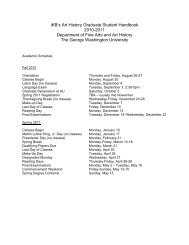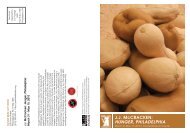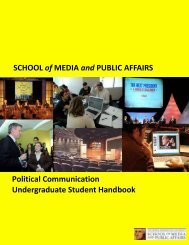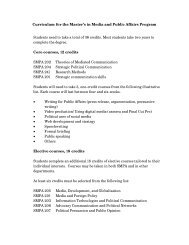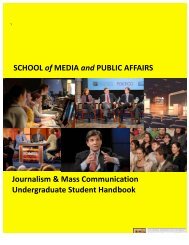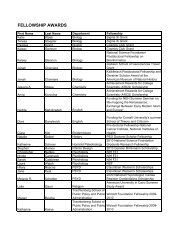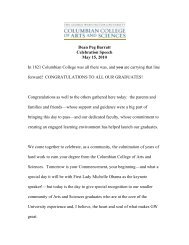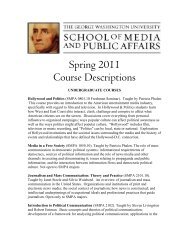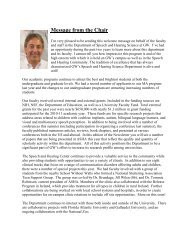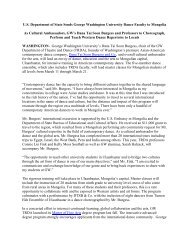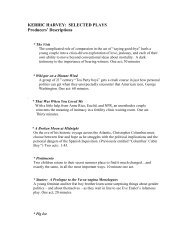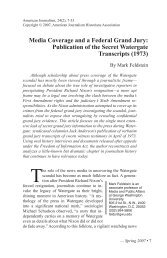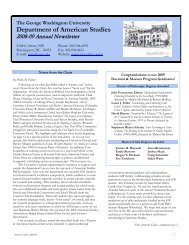Autism Forensic Science Immigration Trends Teaching Recipe for ...
Autism Forensic Science Immigration Trends Teaching Recipe for ...
Autism Forensic Science Immigration Trends Teaching Recipe for ...
Create successful ePaper yourself
Turn your PDF publications into a flip-book with our unique Google optimized e-Paper software.
In Remembrance<br />
In addition to Lee Sigelman<br />
and Robert H. Smith, we note<br />
the passing of the following<br />
members of our Columbian<br />
College community over the<br />
past 12 months:<br />
Department of Physics Chair<br />
and Professor Barry Berman,<br />
74, whose expertise was in<br />
experimental nuclear physics.<br />
berman joined the GW faculty<br />
in 1985 and was named a<br />
Columbian College of Arts<br />
and <strong>Science</strong>s Distinguished<br />
Professor in 1998. He worked<br />
at the livermore national<br />
laboratory <strong>for</strong> more than<br />
20 years, was a fellow of the<br />
American Physical Society,<br />
and published more than<br />
400 scholarly articles. berman<br />
was also an accomplished<br />
musician, merging his love <strong>for</strong><br />
music with his love <strong>for</strong> science<br />
in a popular Physics of music<br />
course he taught.<br />
robert m. dunn Jr., 71,<br />
professor emeritus of<br />
economics, retired from GW<br />
in 2009 after more than 40<br />
years on the economics faculty.<br />
He taught microeconomics,<br />
macroeconomics, and<br />
international trade and<br />
finance at the undergraduate<br />
and graduate levels. Dunn<br />
authored and co-authored<br />
numerous publications,<br />
including the textbook<br />
International Economics, which<br />
is now in its sixth edition from<br />
Routledge Publishing. His<br />
articles appeared in the Journal<br />
of Political Economy, and he<br />
wrote numerous columns <strong>for</strong><br />
The Washington Post and The<br />
New York Times.<br />
Alumnus and Heritage Society<br />
member John W. Kendrick, 92,<br />
PhD ’55, an expert in the field<br />
of productivity and chief<br />
economist <strong>for</strong> the u.S.<br />
Department of Commerce<br />
in the 1970s, taught in the<br />
Department of economics<br />
<strong>for</strong> more than 30 years.<br />
A respected scholar, he<br />
wrote more than a dozen<br />
books, including the popular<br />
textbook Productivity <strong>Trends</strong> in<br />
the United States. At Columbian<br />
College, he is remembered<br />
as a dedicated colleague<br />
who profoundly influenced<br />
generations of scholars<br />
and practitioners.<br />
Alumnus and research pioneer<br />
hans lineweaver, bA ’30, mA<br />
’33, developed the lineweaverburk<br />
equation <strong>for</strong> enzyme<br />
kinetics. He was 101<br />
at the time of his death. During<br />
a 40-year tenure at the u.S.<br />
Department of Agriculture,<br />
he led ef<strong>for</strong>ts to improve food<br />
processing and safety practices<br />
<strong>for</strong> eggs and poultry. He became<br />
president of the institute of<br />
Food Technologists in 1971<br />
and authored or co-authored<br />
more than 100 technical<br />
publications. He was the<br />
holder of six patents.<br />
ruth helm osborn, 90,<br />
professor emeritus and<br />
founder of the Department of<br />
Women’s Studies, established<br />
“Developing new Horizons <strong>for</strong><br />
Women,” one of the country’s<br />
first continuing education<br />
programs <strong>for</strong> females. A true<br />
pioneer in the field, she<br />
advised more than 400<br />
colleges and universities on<br />
women’s programs. osborn<br />
earned both her master’s<br />
degree and her doctorate in<br />
counseling, education, and<br />
psychology from GW. She<br />
retired from the university<br />
in 1979. A past president of<br />
The Columbian Women<br />
of GWu, she was a recipient<br />
of the Distinguished Alumni<br />
Achievement and Service awards.<br />
James W. robb, 92, professor<br />
emeritus of Romance languages<br />
and an authority on the mexican<br />
essayist Alfonso Reyes, joined<br />
the Columbian College faculty<br />
in 1958. He taught language<br />
courses in Spanish, French, and<br />
Portuguese be<strong>for</strong>e retiring in<br />
1996. Robb also lectured<br />
extensively and directed<br />
symposia on ibero-American<br />
literature, traveling to countries<br />
throughout the Spanish- and<br />
Portuguese-speaking world.<br />
Professor of Geography and<br />
Geosciences george stephens,<br />
66, earned both his bachelor’s<br />
and master’s degrees in geology<br />
from GW. He joined the faculty<br />
in 1978 and served in numerous<br />
administrative and committee<br />
capacities, including as deputy<br />
director of the university Honors<br />
Program. Stephens was highly<br />
regarded as a caring and<br />
dedicated teacher and mentor.<br />
Students particularly admired<br />
his passion as they trekked<br />
with him over the terrain<br />
that <strong>for</strong>med the laboratory<br />
<strong>for</strong> his classes.<br />
Retired Professor of english<br />
literature robert h. Walker Jr.,<br />
85, joined the Columbian<br />
College community in 1959<br />
and served as director of the<br />
American Studies Program.<br />
He published several books<br />
including The Poet and the<br />
Gilded Age: Social Themes in<br />
Late Nineteenth-Century<br />
American Verse. be<strong>for</strong>e retiring<br />
in 1996, Walker won u.S. State<br />
Department and Fulbright<br />
grants to study in europe,<br />
South America, Asia, and<br />
the middle east.<br />
columbian college of arts and sciences memoriam page 47



